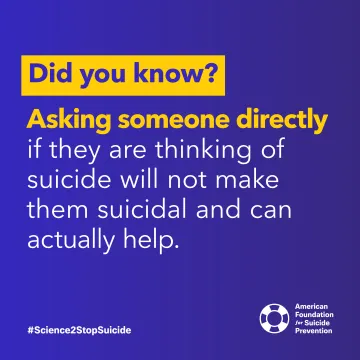Notice. Care. Help.
It’s always a good idea to check in.
Everyone struggles with their mental health from time to time. Even though struggling doesn’t automatically mean suicide, it could put someone at increased risk. Common signs of mental health struggles may not always be visible, and sometimes, they become more apparent after a suicide or suicide attempt. Awareness of these signs is valuable.
We Can All Help to Prevent Suicide
The Nature of Warning Signs
Suicide Warning Signs and Risk Factors to Watch For
If you're concerned about your mental health or someone else's, take a free screening on Mental Health America.
If you're concerned that someone might be at risk for suicide, you've probably noticed some changes in them recently that make you feel uncomfortable. Maybe you can't put your finger on it, but "something" is different. It is often the combination of risk factors (substance abuse, a major life change, financial concerns, etc.) and the warning signs below that you may have noticed.
Answer the questions below to determine if someone you care about is at risk for suicide:
- Self-isolation (withdrawing from family, friends, and regular activities)
- Increase in alcohol or drug use
- A change in online presence (websites they’re going to, what they’re posting, what they’re reading and talking about, how frequently they’re posting)
- Sudden, significant drop in grades or performance at work
- Dramatic change in appearance and behavior
- Language, research, books you’re reading, projects around themes of helplessness, hopelessness, death, being a burden
- Giving away important possessions
- Abrupt or dramatic change in mood
- Talking about suicide
Any direct reference to mental health struggles. Here’s what you might hear:
- I just want to die.
- I just can't do this anymore.
- I'm such a burden.
- Life isn't worth anything.
- I won't be around to deal with that.
- If he/she breaks up with me, I can't/won't go on.
- There is nothing I can do to make it better.
- My family would be better off without me.
- I feel there is no way out.
- It's hopeless/pointless/useless.
- I have no reason to live.
It can be hard for people to come out and talk about mental health struggles or thoughts of suicide. Here’s what you might hear instead:
- I’m having a hard time
- I have a lot on my plate right now
- I can't stand the pressure anymore.
- What's the point/it’s pointless
- I’m feeling really overwhelmed
- I wish I could just get a break from it all/just go to sleep forever/run away
- “I should just kill myself,” said in a joking tone
If you answered 'yes' to any of the above, your loved one could be struggling with their mental health and may be at an increased risk for suicide. It's important to take all warnings seriously.
Counselor Tip: How you help starts with knowing more about the situation. It's okay to ask someone about depression and suicide.
Asking them about suicide won't give them the idea or push them into doing it.
-
Ask specifically about suicide. Example: “Are you thinking of suicide?” or “Are you thinking of killing yourself?”
-
Support them in getting help.
-
Share helpful resources with them.
* If you or someone you know is experiencing a life-threatening emergency, call 911 or go to your local emergency room.

Key tips to remember during this conversation:
DO
- Take it seriously.
- Be willing to listen.
- Voice your concern.
- Let your friend know you care and understand.
- Ask if they have a plan and how far they have gone in carrying it out.
- Get professional help immediately.
AVOID
- Be sworn to secrecy.
- Act shocked or surprised at what the person says.
- Challenge or dare.
- Assume the situation will take care of itself.
- Argue or debate moral issues.
- Make them feel guilty or ashamed.
If the thought ever crosses your mind that someone is thinking about suicide, ask them.

